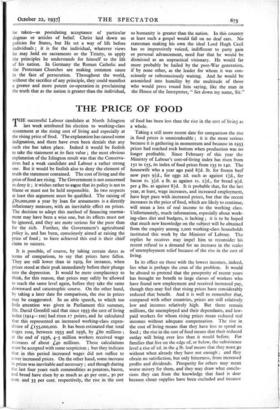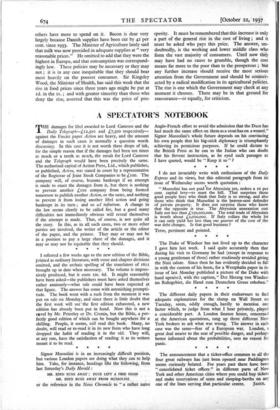THE PRICE OF FOOD
THE successful Labour candidate at North Islington last week attributed his election to working-class resentment at the rising cost of living and especially at the rising price of food. The explanation has caused some indignation, and there have even been denials that any such rise has taken place. Indeed it would be foolish to take the statement at its face value ; the most obvious explanation of the Islington result was that the Conserva- tives had a weak candidate and Labour a rather strong one. But it would be foolish also to deny the element of truth the statement contained. The cost of living and the price of food are rising. The Government is not concerned to deny it ; it wishes rather to argue that its policy is not to blame or must not be held responsible. In two respects at least this argument must be qualified. The raising of £80,000,000 a year by loan for armaments is a directly inflationary measure, with an inevitable effect on prices. The decision to adopt this method of financing rearma- ment may have been a wise one, but its effects must not be ignored, and they are more serious for the poor than for the rich. Further, the Government's agricultural policy is, and has been, consciously aimed at raising the price of food ; to have achieved this end is their chief claim to success.
It is possible, of course, by taking certain dates as terms of comparison, to say that prices have fallen. They are still lower than in 1929, for instance, when prices stood at their peak immediately before their plunge into the depression. It would be mere complacency to think, for this reason, that prices may safely be allowed to reach the same level again, before they take the same downward and catastrophic course. On the other hand, by taking a later date for comparison, the rise in prices may be exaggerated. In an able speech, to which too little attention was given in Parliament this summer, Mr. David Grenfell said that since 1933 the cost of living index (1914=100) had risen 17 points, and he calculated that this represented an increased working-class expen- diture of £155,000,000. It has been estimated that total wages rose, between 1933 and 1936, by £6o millions ; at the end of 1936, 4-5 million workers received wage increases of about L4o millions. These calculations must be accepted with some scepticism ; but they indicate that in this period increased wages did not suffice to cover increased prices. On the other hand, some increase in prices was inevitable and necessary ; and though during the last four years such commodities as potatoes, bacon, and bread have risen by as much as 4o per cent., 3o per cent. and 33 per cent. respectively, the rise in the cost of food has been less than the rise in the cost of living as a whole.
Taking a still more recent date for comparison the rise in food prices is unmistakeable ; it is the more serious because it is gathering in momentum and because in 1933 prices had reached rock bottom when production was no longer profitable. Since February of this year the Ministry of Labour's cost-of-living index has risen from 151 to 155, its index of food prices from 135 to 140. The housewife who a year ago paid 81d. lb. for frozen beef now pays 9,1d., for eggs 2d. each as against 1 1c1., for bacon is. d. a lb. as against Is. 21d., for bread 91,d. per 4 lbs. as against 8',d. It is probable that, for the last year, at least, wage increases, and increased employment, have kept pace with increased prices, but that the recent increases in the price of food, which are likely to continue, will mean a loss of real income to the working class. Unfortunately, much information, especially about work- ing-class diet and budgets, is lacking ; it is to be hoped that much new knowledge on the subject will be obtained from the enquiry among 2,000 working-class households instituted this week by the Minister of Labour. The replies he receives may impel him to reconsider his recent refusal to a demand for an increase in the scales of unemployment relief because of the rise in the cost of living.
In its effect on those with the lowest incomes, indeed, lies what is perhaps the crux of the problem. It would be absurd to pretend that the prosperity of recent years has brought no benefit to large classes of workers who have found new employment and received increased pay, though they .may feel that rising prices have considerably reduced that benefit. And it is well to remember that, compared with other countries, prices are still relatively low and incomes relatively high. But there remain millions, the unemployed and their dependants, and low- paid workers for whom rising prices mean reduced real incomes without adequate compensation. The rise in the cost of living means that they have less to spend on food ; the rise in the cost of food means that their reduced outlay will bring ever less than it would before. For families that live on the edge of, or below, the subsistence level a rise of id. in the 4 lb. loaf means that they must go without when already they have not enough ; and they obtain no satisfaction, but only bitterness, from increased profits and dividends. Prosperity for others may mean worse misery for them, and they may draw what conclu- sions they can from the knowledge that food is dear because cheap supplies have been excluded and because others have more to spend on it. Bacon is dear very largely because Danish supplies have been cut by 42 per cent. since 1933. The Minister of Agriculture lately said that milk was now provided in adequate supplies at " very reasonable prices." He omitted to add that they were the highest in Europe, and that consumption was correspond- ingly low. These policies may be necessary or they may not ; it is in any case inequitable that they should bear most heavily on the poorest consumer. Sir Kingsley Wood, the Minister of Health, has said this week that the rise in food prices since three years ago might be put at id. in the is. ; and with greater sincerity than those who deny the rise, asserted that this was the price of pro- sperity. It must be remembered that this increase is only a part of the general rise in the cost of living ; and it must be asked who pays this price. The answer, un- doubtedly, is the working and lower middle class who form the vast majority of consumers. Until now they may have had no cause to grumble, though the cost means far more to the poor than to the prosperous ; but any further increase should receive the most serious attention from the Government and should be counter- acted by a radical modification in its agricultural policies. The rise is one which the Government may check at any moment it chooses. There may be in that ground for reassurance—or equally, for criticism.































































 Previous page
Previous page